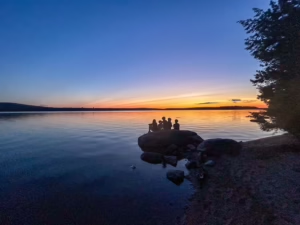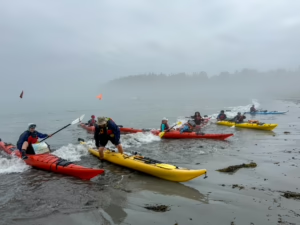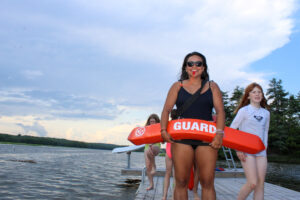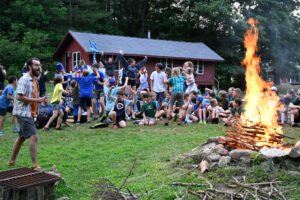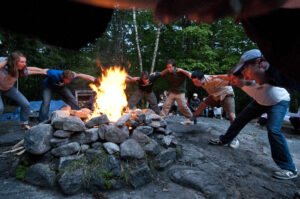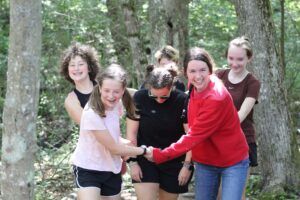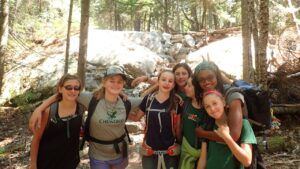In Wes Anderson’s hilarious and poignant coming-of-age film “Moonrise Kingdom,” one of the most memorable characters is Scoutmaster Randy Ward, a somewhat bumbling but earnest Khaki Scout troop leader played by Edward Norton, in charge of a fictional summer camp set in New England in the 1960’s.
In one memorable scene in the movie a young Khaki Scout corners Ward and asks, “What’s your real job, sir?”
Confusion floods Ward’s face as he struggles to understand the question.
“Yes, your real job.”
With a blink, Ward finally replies, “High School Math Teacher.”
The scouts clustered around him frown with disappointment at such a mundane answer to the question.
Later in the scene, as Ward scrambles to organize a search party for a missing camper, he announces to his assembled group, “I’m going to change my answer. Scout Master Ward is my real job. Math teacher is something I do on the side.”
With huge appreciation for actual math teachers (you folks are awesome! #mathlife) That scene from Moonrise Kingdom highlights a phenomenon that is likely familiar to anyone who has worked at a summer camp:
 “Summer Camp Counselor is not a real job.” Refuting this claim (almost always made by someone who has never worked as a camp counselor) has become the centerpiece of Project Real Job, an initiative by the American Camping Association to highlight the very real benefits of working at a summer camp.
“Summer Camp Counselor is not a real job.” Refuting this claim (almost always made by someone who has never worked as a camp counselor) has become the centerpiece of Project Real Job, an initiative by the American Camping Association to highlight the very real benefits of working at a summer camp.
With approximately 1.2 million teens and adults supervising 26 million campers each year in the United States, there is an awful lot of real work being done out there. In fact, the U.S. youth camp industry contributes $70 billion to the national economy, which include business-to-business purchases and labor income, according to a recent study from the University of Michigan and American Camping Association.
At Chewonki, the size of our staff swells each summer as we hire over a hundred seasonal positions for our Camp Chewonki and Leadership Expedition programs. Many of these roles are filled by former campers eager to stay connected, college students seeking career development in education and outdoor recreation, established teachers looking for rejuvenating summer gigs, international students eager to visit the United States, and local folks who enjoy working in Maine’s growing outdoor recreation economy.

And while the roles at a summer camp take a wide range of forms; counselor, cook, nurse, trip leader, maintenance, activity specialist, administrator, and much more- they all share in the same fast-paced summer fun and community building that makes working at a summer camp so unique and rewarding.

According to Katie Goodman, Director of Camp Chewonki, one of the reasons some people discount summer camp as “a real job” is in part because camp is fun! “The essential brand of summer camp is linked to fun.” says Goodman. “And that glow of fun can overshadow all the hard work that goes into supporting children, the risk management, the leadership and organizational skill it takes to be a counselor.”

Summer camp jobs are also physically demanding, with long days of intense activity that stretch from dawn to dusk, and emotionally charged as staff engage, guide, and mentor their campers through all the laughs and tears that make up a summer experience.
“I think the most challenging part of the job, for many, is figuring out how to support yourself while supporting others,” says Goodman, “The kids have to be the top priority and a counselor’s job is to always be alert and mindful to make sure their campers are safe – physically and emotionally, having fun, building positive relationships, etc. But they also have to take care of themselves!”
“For many staff, this might be the first time in their adult lives they’re responsible for another person (let alone a group of children) and it takes a different level of mental and emotional awareness to manage your energy levels,” says Goodman.

Summer camp jobs have also been highlighted for the wide range of individual leadership and management skills they require staff master:
- Leading teams through simple and complex objectives
- Mastering time management and risk management
- Developing a high degree of empathy and listening skills
- Building problem-solving and teamwork skills
- Becoming comfortable with uncertainty and adaptability
- Integrating creativity, and fostering creativity in others
Kevin Trapani, the CEO of The Redwoods Group, recently wrote a blog post Camp as the Ultimate Internship: A CEO’s Perspective, where he shares his insights about the high value of of a summer camp work experience:
“…what I have seen time and time again when hiring as a CEO, is how perfectly camp skills line up with the demands of the flexible, modern workplace. Whether it’s discipline or flexibility, empathy or problem-solving, camp counselors come home with a toolbox of strengths that position them well for their future.“

And of course, the long-term benefits of working at a summer camp emerge from sharing in the larger community as staff build their professional networks, develop their own passions and skills, and have the opportunity to meet diverse groups of new people from around the country and the world.
For many of us who once worked at a summer camp, and have since gone on to other careers and achievements in life, we still trace the origins of our character and passions to those memorable summers in Maine where we helped mentor young campers and made friendships that endured a lifetime.
So the next time someone asks you about your “real job” don’t be afraid to look them in the eye and say, “my real job was back at summer camp, I just do this on the side.”


